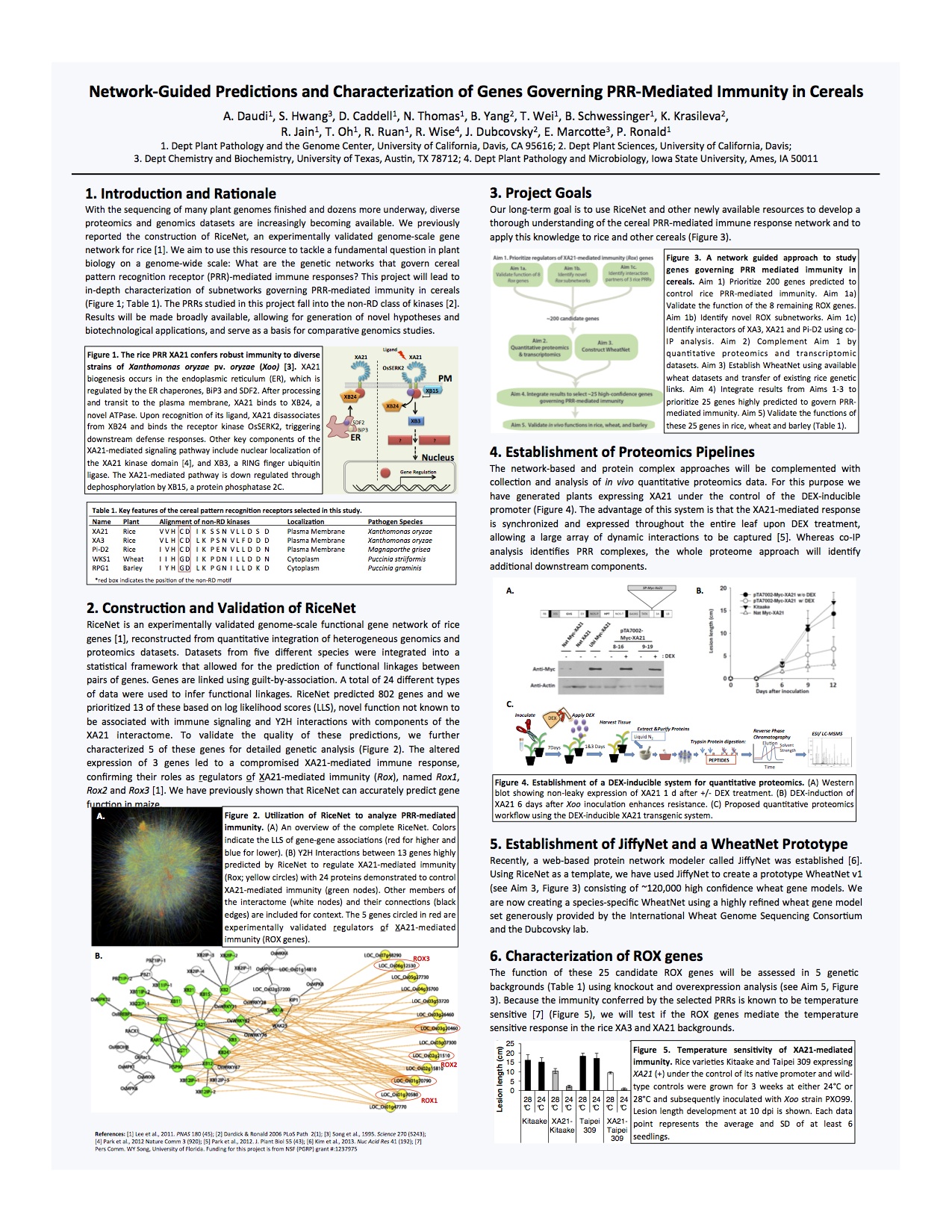Plants and animals sense conserved microbial signatures through receptors localized to the plasma membrane and cytoplasm. These receptors, often called pattern recognition receptors (PRRs), typically carry or associate with non-arginine-aspartate (non-RD) kinases that initiate complex signaling networks cumulating in broad-spectrum resistance. While it is now widely appreciated that PRRs play a key role in the immune response of plants and animals, little is known about the signaling pathways governing these responses. This is especially true in monocotyledonous species, which are estimated to contain a ten-fold larger number of PRRs as compared to dicots.
This project exploits our experimentally validated genome-scale functional gene network of rice genes, named RiceNet, to explore PRR-mediated immune responses in cereals on a genome-wide scale. We will take advantage of the observation that genetic modifiers of the same gene often cluster in gene networks. Thus, novel regulators of PRR-mediated immune responses can be effectively identified and prioritized based on local connectivity in such networks. As part of this project we will identify and validate subnetworks (i.e. sets of genes) governing rice, barley and wheat PRR-mediated immune responses, generate a new dataset for rice based on an innovative proteomics approach, and establish a genome-scale functional network for wheat. These objectives will serve as a starting point to develop new strategies for engineering resistance in cereal crops.
The project integrates the computational and proteomics expertise of the co-PI with the immunity and rice functional genomics expertise in the PI's laboratory to achieve the following objectives: 1). Prioritize 200 genes predicted to control rice PRR-mediated immunity via identification of subnetworks and proteomic analysis of interaction. 2). Complement the pure network-based approach by collection and analysis of quantitative proteomics and transcriptomic datasets. 3). Establish a WheatNet prototype using available transcriptomic wheat datasets and transfer of existing rice genetic links to wheat. 4). Integrate results from objectives 1-3 to prioritize a short list of 25 high-confidence genes governing PRR-mediated immune responses. 5). Validate the in vivo functions of these 25 candidates in immune responses mediated by three rice PRRs, one wheat PRR and one barley PRR.
This project will lead to in-depth characterization of subnetworks governing PRR-mediated immunity in cereals. Results will be made broadly available, allowing for generation of novel hypotheses and biotechnological applications, and serve as a basis for comparative genomics studies. Results from these studies will lead to major advances in understanding the PRR-mediated immune response of cereal crops. Because pathways controlling PRR-mediated responses in rice are similar to those in other plants and animals, the expected results will be relevant to other species.
Researchers at all levels, from undergraduate student interns through postdoctoral scientists, will receive essential training in genomics, proteomics, pathology, and systems biology. The Networks in Immunity (NetI) Workshop will facilitate collaborations between increasing numbers of researchers in this important discipline.
Pamela Ronald, PI. Department of Plant Pathology and the Genome Center, University of California at Davis
Edward Marcotte, coPI. Department of Chemistry and Biochemistry, Institute for Cellular and Molecular Biology, University of Texas at Austin
Data Available to Download
Click here to download the poster.
